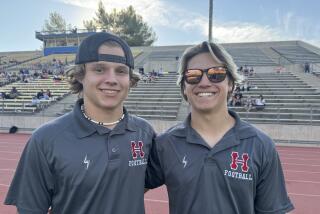There’s a Lot Riding on His Success in Baseball
- Share via
Cameron Hart is a 15-year-old sophomore center fielder for Los Angeles Crenshaw. Like many of his peers, he loves football and basketball, but he also has developed an interest in baseball.
“I haven’t really found what I like most, but right now I’m excelling in baseball,” he said.
As a three-sport athlete with a 4.0 grade-point average, he has become a symbol of hope for John Young, the founder of Reviving Baseball in the Inner Cities.
There are 2,900 boys and girls in the RBI program in Los Angeles, but Hart fits the profile of exactly the kind of student-athlete Young is seeking to encourage.
“What RBI is trying to do is we want to get [African American] kids in the college pool,” he said. “With drafted kids coming primarily out of colleges, this is the type of kid we have to keep playing baseball.”
In the latest NCAA Student-Athlete Ethnicity Report from 2003-04, only 6.1% of Division I baseball players were black.
Major league teams have been shifting focus and redirecting scouting resources to the college game, and the lack of African American athletes playing college baseball is troubling. At UCLA, there are two African American baseball players. At USC, there are none.
With blue braces on his teeth that match the team colors of his school, the 5-foot-10 Hart would seem an ideal candidate to master the game. He has speed, a good arm, agility and talent. But he could also be the starting quarterback for Crenshaw’s football team next fall and he plays basketball.
Academically, last semester, he earned A’s in Algebra II, biology, world history, English and Spanish II. His football coach, Robert Garrett, said he sees Hart becoming a “lawyer, doctor or president of the United States.”
His mother, Carole, was Crenshaw student body president in 1980. His father, Craig, was a football team captain there. They’ve taught their son the importance of academics and have strongly supported a school that briefly lost its accreditation last year.
“You can’t make it better unless you’re part of the solution,” Carole said. “There are life lessons in an urban school. You find a perfect school, you let me know. Cameron is a role model on the field and in the classroom.”
How Hart is able to play three sports, get straight A’s and still have a girlfriend tells plenty about his ability to manage time.
“I think I’m mature for my age because I know I want to be successful in life and know I have to work hard,” he said.
And he knows his parents are always watching. They attend his games, meet with his teachers and expect him to do his best.
“My dad has always told me he’ll be my biggest fan and worst critic,” he said. “He’ll tell me what I did wrong and what I did right.”
As a baseball player, Hart is batting better than .400 with 27 stolen bases in 30 attempts. Twice he has thrown out runners at the plate trying to score from third base on fly balls.
“I like the fact there’s no prototype player,” he said. “In football, the linemen have to be 6-5, 300 pounds. Receivers have to be a certain size. In baseball, you can shine for what you are and how you play. It’s a game anyone can learn.”
This summer, he’ll be spending time at the Major League Baseball Urban Youth Academy in Compton. He’ll be playing on a travel team that will compete at the Junior Olympics in Arizona. It will be a step up in competition for Hart, who also has summer football and basketball commitments.
Young will be doing his best to give Hart a chance for exposure in baseball because there’s much at stake. Next year is the 60th anniversary of Jackie Robinson breaking the color barrier and reaching the major leagues.
Young wants Hart and other black teens to follow, and if that means going to college instead of signing out of high school, so be it.
“We have to get this kid,” Young said. “He’s the challenge I have for RBI.”
Eric Sondheimer can be reached at eric.sondheimer@latimes.com.
More to Read
Fight on! Are you a true Trojans fan?
Get our Times of Troy newsletter for USC insights, news and much more.
You may occasionally receive promotional content from the Los Angeles Times.







